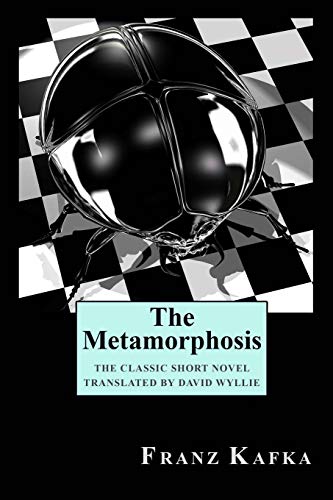If someone told me they woke up as a bug, I’d think they had too much bad cheese. But in Franz Kafka’s “The Metamorphosis,” that’s exactly what happens. Welcome to a world where a regular guy named Gregor Samsa turns into an insect overnight. And yes, I’m here with a review that will tickle your funny bone and also give you the lowdown on whether this bizarre tale is worth your time. Let’s scuttle through the ups and downs of Gregor’s unfortunate buggy existence!
In a nutshell
“The Metamorphosis” by Franz Kafka is a classic of absurdist fiction. It’s a wild and wacky ride through one man’s unexpected transformation into a giant bug. Gregor Samsa, the protagonist, wakes up one morning to find himself mysteriously transformed into a creature straight out of a backyard horror flick.
This novel explores deep themes of isolation, identity, and the struggles of everyday life that are more relatable than you’d expect. You know, like when you face a Monday, and it feels like everyone is speaking a different language. It’s funny, it’s thought-provoking, and it makes you ponder how you’d react if your brother turned into a giant cockroach. Spoiler alert: probably with less grace than Gregor’s family!
Kafka, the master of blending reality with the surreal, makes you question the world around you in ways that are both entertaining and a bit unsettling. If you’re into books that are as much about the feels as they are about the plot, this one’s for you!
The Metamorphosis: Gregor’s Unusual Transformation into an Insect
Picture this: You wake up in the morning, expecting to start your day with the usual routine, only to find yourself transformed into a giant insect. That’s exactly what happens to Gregor Samsa in Franz Kafka’s The Metamorphosis. Now, if I had a penny for every time I woke up feeling like a bug after a bad night’s sleep, I’d have at least three or four pennies! But for Gregor, it’s no dream. His new exoskeleton isn’t just
Family’s Rollercoaster Reaction to Gregor’s Metamorphosis
When Gregor Samsa first morphs into a giant insect, it’s like the family got hit by a freight train. They don’t know whether to be scared or intrigued. I mean, wouldn’t you? Imagine waking up to your sibling turned into a monstrous bug. What’s next, the dog doing taxes?
Gregor’s parents and sister go from confused to downright flabbergasted. His father, Mr. Samsa, reacts like he’s seen a ghost. Or worse, me without my morning coffee. He tries to shoo Gregor back into his room with a newspaper and a cane, not the most effective bug strategy, I’d say. Meanwhile, Mrs. Samsa almost faints. I once saw my mom react similarly when she found out I didn’t do the dishes.
Gregor’s sister, Grete, starts off handling things fairly well. Initially, she brings him food, like she’s got a pizza delivery service for bugs. But over time, her sympathy wears thin. Her patience shrinks faster than my attention span during a math lecture. As the family’s initial shock turns into acceptance, everything in the household changes, from meal arrangements to financial burdens. It’s like one of those home makeover shows, but way less fun and a lot more existential dread.
Ultimately, Gregor’s metamorphosis exposes the fragility of family bonds under pressure. Everyone’s true colors show, and spoiler alert: not everyone’s a winner in this personality pageant. The family’s reaction is as much a transformation as Gregor’s own.
Get ready for the next section, where we’ll explore the heavy themes of isolation and alienation. Pack your metaphorical suitcase, because we’re journeying into the depths of solitude and otherness!
Themes of Isolation and Alienation in The Metamorphosis
Ah, isolation and alienation. Sounds like the lunchroom in high school. Well, ‘The Metamorphosis’ paints an even more awkward picture. Imagine waking up one day, eager to hit the snooze button, but whoops—you’re a giant bug. Talk about a reason to skip work!
Gregor Samsa, our unlucky protagonist, not only transforms into an insect but also becomes the embodiment of alienation. His new buggy body repulses his family and leads to extreme isolation. If I had a nickel for every time one of my relatives avoided me because I didn’t resemble a cockroach, I’d have zero nickels.
Kafka shows us how Gregor’s family gradually drifts away. They keep him locked away like last year’s fruitcake. His room becomes a prison, and his family’s initial shock morphs into discomfort, resentment, and indifference. His sister, who once cared, starts seeing him differently, probably wondering if she should buy Raid in bulk to handle this situation.
Isolation isn’t just physical for Gregor. He struggles mentally with losing his identity. From workaholic salesman to insect, his job loss adds another layer of alienation. It’s like losing a part of one’s self without the severance package.
Kafka cleverly uses Gregor’s transformation to comment on how individuals feel disconnected from society, even in familiar settings. The theme resonates through every awkward silence and locked door, emphasizing the crushing weight of loneliness and isolation. If Kafka wanted us to feel it, he achieved it magnificently.
Stay tuned as we crawl into the next section, where we unravel the layers of symbolism and underlying metaphors in this bug-infested narrative!
The Deep Symbolism and Metaphors in ‘The Metamorphosis’
Let’s talk symbolism, folks! When we read ‘The Metamorphosis,’ written by our pal Franz Kafka, we don’t just meet a man who turns into a giant bug—and not just because that’d be too easy. Nah, Kafka’s got layers here, like an onion or a really complicated lasagna!
Gregor Samsa’s transformation into a massive insect is one of the big metaphors at play. It’s not about some random pest problem. Instead, it’s a symbol of feeling dehumanized and alienated by society and family. I mean, haven’t we all felt like Gregor at some point, running late for work, feeling like a bug on the wall?
His bug form shows the disconnect between his inner emotions and the outer world. It’s like that time I dressed up as a banana for a costume party and everyone else showed up in tuxedos—awkward! Gregor’s change forces his family to face their own selfishness and dependence on him, revealing the cracks in their relationships. It’s deep stuff, like those motivational posters that make you think.
And let’s not forget the apple stuck in Gregor’s back that his dad throws. It’s kind of like an apple of knowledge from the Biblical tale but also a mark of betrayal and pain. Who knew fruit could be so aggressive?
So, do I recommend ‘The Metamorphosis’? Well, if you’re into stories with depth, symbolism, and a dash of dark humor, then absolutely! But if you’re looking for a light-hearted insect romp, you might wanna skip this one. Happy reading!
Conclusion
So, that’s it for my review of The Metamorphosis. This book, by Franz Kafka, is a quirky dive into absurdist fiction. It’s a weird ride, but oh-so-worth it! Witnessing Gregor Samsa’s transformation into a giant bug and his family’s chaotic response gives both chills and chuckles. The themes of isolation and identity provoke serious thought, making it a true standout in the literary world. It might not be the perfect summer beach read, but for those who love their books with a side of bizarre, I highly recommend it. Just remember, it’s not for the faint of heart – or stomach!



